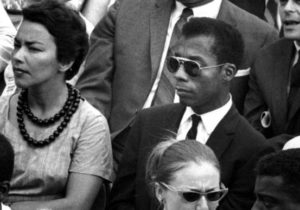 Raoul Peck provides rare insight into the struggle for African American rights, through the voice of the great black author James Baldwin.
Raoul Peck provides rare insight into the struggle for African American rights, through the voice of the great black author James Baldwin.
James Baldwin was one of the great American novelists of the 20th century, with his most important fiction written in the 1950s and 60s. As an African American intellectual during those crucial years, he also felt compelled to be an essayist, with his main subject being the centrality of race in the tragedy of American history. With Notes of a Native Son and The Fire Next Time, among other books, he came to the forefront of the national conversation with his uncompromising dedication to painful truths. And as a gay man before that was widely tolerated or even discussed, he inspired hostility and misapprehension from both right and left. Now, almost thirty years after his death, his genius is not as well known, at least not in what we’d call the mainstream, but Raoul Peck’s powerful new film, I Am Not Your Negro will hopefully remedy that.
Peck is a Haitian director with an impressive resumé of cutting edge political documentaries and fiction films, and here he transcends himself by stepping back and letting Baldwin’s own words carry the picture. Peck was initially inspired by a project that was never finished—a book, proposed by Baldwin to his agent, that would explore the lives of Medgar Evers, Malcolm X, and Martin Luther King, all men that Baldwin knew personally, and all of course assassinated. Following Baldwin’s notes, with a wealth of footage from the civil rights era, including television interviews and other speaking engagements by Baldwin himself, Peck uses the framework of the three martyred black leaders as a jumping off point for a wide-ranging look at the history of African Americans, and of white racism and oppression, as examined in Baldwin’s articles and essays.
The brilliant strategy in the film is that there are no interviews of people who knew him, and virtually no other narrative voices. Baldwin is, in effect, the author of this film, and the credits for I Am Not Your Negro say indeed “written by James Baldwin.” When we are not hearing Baldwin actually speak, his written words from a variety of sources are being narrated by Samuel L. Jackson. I must say, this is another master stroke—Jackson is not his familiar persona here; he’s low key and utterly concentrated into the voice of Baldwin, with the gravity, subtlety, and piercing intelligence that requires.
Finally, you must understand that this is not a biography of Baldwin. We only learn incidentally of certain details from his life, such as the fact that he lived in Paris for a long time. The subject of the film is actually the predicament of the Negro living under oppression, and the problem of white racism. Negro was the accepted term during the 50s and 60s. Baldwin turned it into an accusatory term, and the film builds and presents a spiritual and emotional reality for the viewer that brilliantly evokes the painful dilemma of race in America.
Even someone familiar with the period may find themselves moved by Baldwin’s incisive critique. One of his major thrusts, important to the understanding of this film, is that the Negro (or in fact the “n” word, which he would use in these instances) is an invention of white America. For he is a man, just a man. The challenge for America, the challenge it must meet in order to survive, is to discover why white people needed to create this Negro, the “n” word, and to find out how it can free itself from the mental and emotional bondage that racism creates.
There is much more to be experienced and understood in watching this immensely insightful, disturbing, beautiful, tragic and inspiring film. More than I can even try to describe. For those committed to understanding themselves as Americans, and to long-needed change in our society, I Am Not Your Negro is essential viewing.

